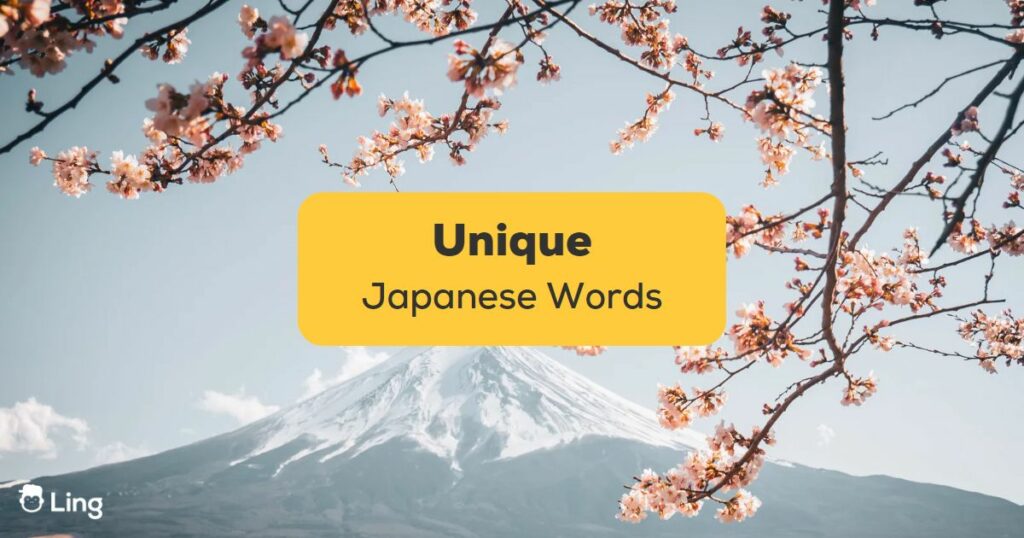There are many beautiful words in the Japanese language I wish we had in English as well. Unfortunately, these unique Japanese words don’t have an English equivalent, but that’s what makes them unique in the first place!
In Japanese culture, it’s important to value and appreciates even the smallest details in life. Because life is much more than what we see around us. I’m really thankful to the Japanese language and philosophy for coming up with such beautiful Japanese words with deep meaning. Keep reading if you want to learn what these nine cool Japanese words are!

1. Komorebi – 木漏れ日
Meaning: Rays of sunlight beaming through tree leaves.
You must have seen sunlight beams shine through the trees when hiking in the forest. It’s a shame that no words can describe this beautiful view in English. But there is a beautiful word for it in Japanese: komorebi. Apart from its literal meaning, komorebi can metaphorically mean the yearning for someone who is in long distance.
Example Sentences
Japanese: 彼女は木漏れ日の中で読書するのが好きです。
Romaji: Kanojo wa komorebi no naka de dokusho suru no ga suki desu.
English: She likes to read books in the komorebi.
Japanese: あの公園に行くと、木々の隙間から木漏れ日が降り注いでいるのが見えます。
Romaji: Ano kouen ni iku to, kigi no sukima kara komorebi ga furisosoideru no ga miemasu.
English: When you go to that park, you can see the sunlight filtering through the trees and the komorebi pouring down.
Japanese: 私はこもれびの中でひと休みするのが好きです。
Romaji: Watashi wa komorebi no naka de hitoyasumi suru no ga suki desu.
English: I like to take a break in the komorebi.
2. Ikigai – 生きがい
Meaning: The purpose of living.
I read a book named Ikigai a few years ago, and since then, this word has become my favorite Japanese word. Basically, Ikigai is the purpose of your life and your reason for living. In Japanese philosophy, it’s believed that everyone has an ikigai in the world, however, some have already found their ikigai, while others are still searching for theirs. Have you found your ikigai yet?
Example Sentences
Japanese: 私たちは生きがいを見つけるために生まれてきたのだと思います。
Romaji: Watashitachi wa ikigai o mitsukeru tame ni umarete kita no da to omoimasu.
English: I think we were born to find our ikigai.
Japanese: 彼女は自分の生きがいを見つけるために、色々なことに挑戦しています。
Romaji: Kanojo wa jibun no ikigai o mitsukeru tame ni, iroiro na koto ni chousen shite imasu.
English: She is trying many things to find her ikigai.
Japanese: 生きがいがあると、毎日が楽しいですね。
Romaji: Ikigai ga aru to, mainichi ga tanoshii desu ne.
English: If you have an ikigai, every day is enjoyable, isn’t it?
3. Wabi-sabi – 侘寂
Meaning: Imperfect beauty.
Though this cool Japanese word sounds similar to wasabi, they have nothing in common. Wabi-sabi is a well-known concept in both traditional Japanese philosophy and aesthetics.
侘寂 (wabi-sabi) is originally a Japanese philosophy about accepting the imperfect and flawed. It didn’t take a long time for Japanese aesthetics to adapt it. It is often used in traditional Japanese arts such as tea ceremonies, pottery, and ikebana (flower arrangement), as well as architecture and interior design.
Example Sentences
Japanese: この家は、古いが、美しい侘寂の美学を持っています。
Romaji: Kono ie wa, furui ga, utsukushii wabi-sabi no bigaku o motteimasu.)
English: This house is old but has the beautiful aesthetic of wabi-sabi.
Japanese: 彼女の芸術作品には、いつも侘寂の要素が含まれています。
Romaji: Kanojo no geijutsu sakuhin ni wa, itsumo wabi-sabi no yōso ga fukumareteimasu.)
English: Her art pieces always include elements of wabi-sabi.
Japanese: 日本の文化において、侘寂は美の一形態として高く評価されています。
Romaji: Nihon no bunka ni oite, wabi-sabi wa bi no ichi keitai toshite takaku hyōka sareteimasu.)
English: In Japanese culture, wabi-sabi is highly valued as a form of beauty.

4. Yūgen – 幽玄
Meaning: Mysterious beauty.
Yugen is the feeling that you get when you look at a unique painting; you think it is beautiful but can’t really understand what makes it beautiful. I also feel a deep emotional response to natural landscapes such as the sunset, starry night, or sea. I think that can be counted as yugen.
Example Sentences
Japanese: この庭園は幽玄な美しさがある。
Romaji: Kono teien wa yūgen’na utsukushi-sa ga aru.
English: This garden has a mysterious beauty.
Japanese: 幽玄な雰囲気を醸し出す古い寺院に立っていると、時間が止まったかのような気がする。
Romaji: Yūgen’na fun’iki o kamoshidasu furui jiin ni tatte iru to, jikan ga tomatta ka no yōna ki ga suru.
English: Standing in an old temple that exudes a mysterious atmosphere, it feels like time has stopped.
5. Nekojita – 猫舌
Meaning: Someone who is sensitive to hot food.
I love how many idioms the Japanese language has about cats! This is one of them. Nekojita literally means “cat tongue,” but it is used to describe a person who can’t eat hot foods or drinks because they are sensitive.
Example Sentences
Japanese: 彼女は猫舌で、いつも食べ物を冷ますのが必要です。
Romaji: Kanojo wa nekojita de, itsumo tabemono o samasu no ga hitsuyōdesu.
English: She is sensitive to hot things, so she always needs to cool down her food.
Japanese: 猫舌だから、熱いラーメンを食べるのは無理だ。
Romaji: Nekojitadakara, atsui rāmen o taberu no wa murida.
English: I can’t eat hot ramen because I’m sensitive to hot things.
6. Tsundoku – 積ん読
Meaning: Buying books but piling them up without reading.
I can relate to this as a book lover myself. I usually read a lot of books, but there are also times that I buy tons of new books with the intention of reading them. But somehow, while waiting for free time, I don’t read them. Does this happen to you as well? Tsundoku refers to this practice: buying new books eagerly but not reading them as eagerly.
Example Sentences
Japanese: 彼は積ん読が多く、本を読み終えるのに時間がかかっている。
Romaji: Kare wa tsundoku ga ōku, hon o yomi oerunoni jikan ga kakatte iru.
English: He has a lot of “tsundoku” and it takes him a long time to finish reading books.
Japanese: 今日は積ん読の本から1冊選んで読み始めようと思います。
Romaji: Kyō wa tsundoku no hon kara 1-satsu erande yomi hajimeyou to omoimasu.
English: Today, I’m going to choose one of my “tsundoku” books and start reading it.

7. Irusu – 居留守
Meaning: Pretending you are not at home.
Have you ever pretended you weren’t at home when someone rang your doorbell? I have, and I know I am not the only one! It’s interesting that Japanese people actually invented a word for it.
Example Sentences
Japanese: 彼はいつも居留守を使って、面倒な用件を回避している。
Romaji: Kare wa itsumo irusu o tsukatte, mendōna yōken o kaihi shite iru.
English: He always uses irusu to avoid troublesome matters.
Japanese: 居留守を使うのは悪いことだと思います。
Romaji: Irusu o tsukau no wa warui kotoda to omoimasu.
English: I think using irusu is a bad thing.
8. Kogarashi – 木枯らし
Meaning: The cold wind that shows the winter is approaching.
木枯らし (kogarashi) is a Japanese word that refers to the cold, dry winds that blow in time between late autumn and early winter. This word is derived from the withered trees and fallen leaves that result from these winds.
Example Sentences
Japanese: 木枯らし一番が吹いたら、そろそろコタツを出そう。
Romaji: Kogarashi ichiban ga fuitara, sorosoro kotatsu wo dasou.
English: When the first kogarashi wind blows, it’s time to bring out the kotatsu.
Japanese: 木枯らしの音が聞こえてくる季節が好きです。
Romaji: Kogarashi no oto ga kikoetekuru kisetsu ga suki desu.
English: I like the season when you can hear the sound of kogarashi winds blowing.
9. Fuubutsushi – 風物詩
Meaning: Things that evoke a particular time of the year or a season.
風物詩 (fuubutsushi) is a beautiful Japanese word that describes things that remind you of a season or a particular time of the year. Some examples I can think of are cherry blossoms, because they are one of the symbols of spring. Or leaves turning into a yellowish color as a symbol of fall. Essentially, anything that reminds you of a season or a particular time, like an object, a scent, or a taste, can be considered a fuubutsushi in Japanese culture.
Example Sentences
Japanese: 大晦日の年越し蕎麦は、日本の冬の風物詩です。
Romaji: Oomisoka no toshikoshi soba wa, Nihon no fuyu no fuubutsushi desu.
English: Eating soba noodles on New Year’s Eve is a Japanese winter tradition.
Japanese: 桜の開花は日本の春の風物詩です。
Romaji: Sakura no kaika wa Nihon no haru no fuubutsushi desu.
English: The blooming of cherry blossoms is a Japanese spring tradition.
After learning the meaning of all of these, who doesn’t want to learn more Japanese words?
Thousands of Japanese learners use Ling to learn Japanese from zero. If you want to become one of them, read below to discover the Ling app!
Learn More Beautiful Japanese Words With Ling!
Looking to improve your language skills and connect with people from around the world? Look no further than Ling, the app that makes language learning fun and easy!
Ling provides Japanese lessons at all levels for you to study at your own pace. You can learn useful Japanese phrases to use in real-life conversations and get a better understanding of the Japanese language by using bite-sized lessons, mini-games, and AI chatbots. Whether you’re learning Japanese for work, travel, or personal growth, Ling has everything you need to know.
So why wait? Grab your iOS or Android device and head to the Google Play Store or Apple App Store to download the Ling app now and join the thousands of Japanese learners who use it to improve their language skills!
Plus, don’t forget to visit our Japanese blog weekly to learn more about the Japanese language and culture!
Until next time, じゃあまたね!



































































